Advatronix Nimbus 400 File Server Review
by Ganesh T S on August 12, 2015 8:00 AM EST- Posted in
- NAS
- storage server
- Avoton
- Advatronix
Performance Metrics - Storage Subsystem
In the previous section, we looked at various benchmarks for databases, web servers, general memory and CPU performance etc. For a file server, the storage performance is of paramount importance, since the main expectation from the system is one of writing to and reading from a disk volume protected against disk failure with some sort of resiliency configuration. In this section, we use Ubuntu 14.04 and mdadm to configure the disks in the hot-swap drive bays in a RAID-5 volume. Selected benchmarks from the Phoronix Test Suite are run with the RAID-5 volume as the target disk.
AIO Stress
Our first test in the storage benchmark is the AIO Stress PTS test profile. It is an asynchronous I/O benchmark, and our configuration tests random writes to a 2048MB test file using a 64KB record size, enabling apples-to-apples comparison with the other results reported to OpenBenchmarking.org. Note that the Nimbus 400 has only four disks while the ASRock C2750D4I ssystem was tested with eight drives.
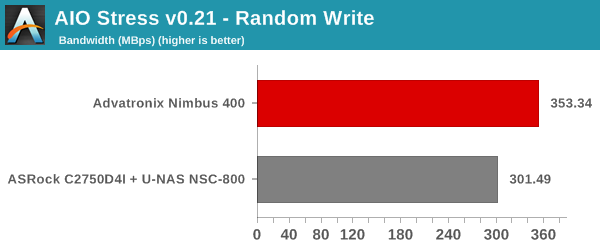
FS-Mark
FS-Mark is used to evaluate the performance of a system's file-system. The benchmark involves determination of the rate of processing files in a given volume. Different test profiles are used - processing 1000 files of 1MB each, processing 5000 files of 1MB each using four threads, processing 4000 files of 1MB each spread over 32 sub-directories and finally, 1000 files of 1MB each without using sync operations to the disk. The processing efficiencies are recorded in the graphs below.
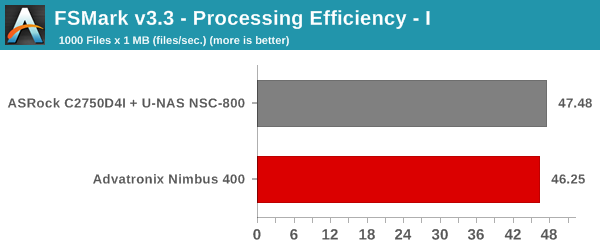
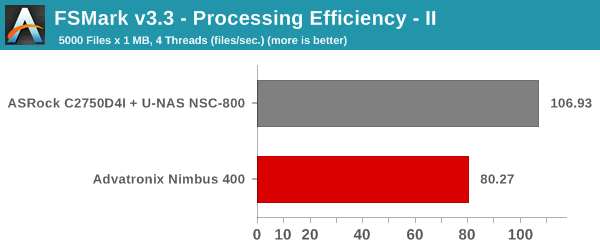
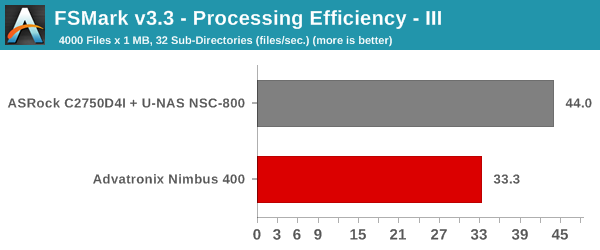
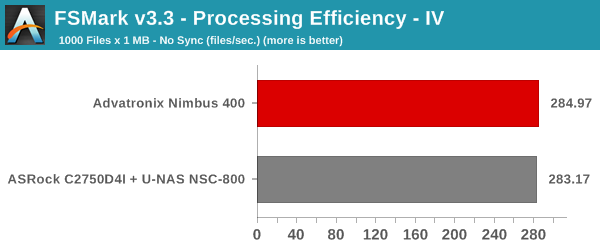
PostMark
This benchmark simulates small-file testing similar to the tasks endured by web and mail servers. This test profile performs 25,000 transactions with 500 files simultaneously with the file sizes ranging between 5 and 512 kilobytes.
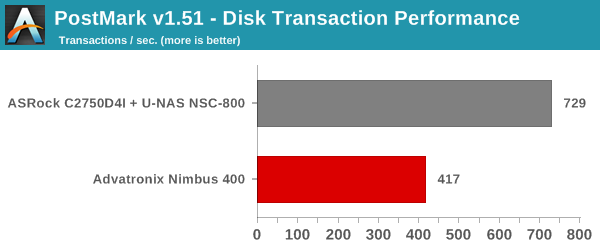
Numbers from the evaluation of other systems can be found on OpenBenchmarking.org.
Both FS-Mark and PostMark seem to be CPU-bound, rather than just disk-bound, according to the above results.










18 Comments
View All Comments
jamyryals - Wednesday, August 12, 2015 - link
This CPU has the "AES New Instructions" which I think would offload most of the encryption costs. In practice, I don't have any experience with it to know either way.http://ark.intel.com/products/77982/Intel-Atom-Pro...
leexgx - Wednesday, August 12, 2015 - link
all the encryption would be done at very high speed with AES hardware in the CPU (assuming the encryption software uses AES like truecrypt does)WithoutWeakness - Wednesday, August 12, 2015 - link
Will you be doing a review of the Nimbus 2000? I've heard it's the fastest model yet!overzealot - Tuesday, August 18, 2015 - link
You're a server, Harry!toyotabedzrock - Wednesday, August 12, 2015 - link
The idle power usage seems very high. Is that while running Windows or Linux?ganeshts - Wednesday, August 12, 2015 - link
That was running Windows Server 2012 R2 with 4x SSDs in the drive bays.bobbozzo - Friday, August 14, 2015 - link
Hi,1. Is the PSU ATX, SFX, or some other standard form factor?
2. is there any dust filter in the front of the case?
Thanks!
DanNeely - Friday, August 14, 2015 - link
It's an ATX PSU. While not a filter per-se the door is a fine mesh that does block a fair amount of dust.